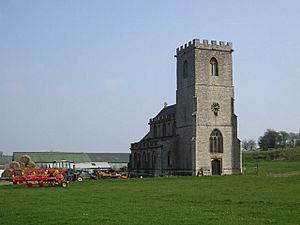Church without dedication, High Ham facts for kids
Quick facts for kids Church without dedication |
|
|---|---|
 |
|
| Location | Low Ham, High Ham, Somerset, England |
| Built | 17th century |
|
Listed Building – Grade I
|
|
| Designated | 17 April 1959 |
| Reference no. | 263114 |
| Lua error in Module:Location_map at line 420: attempt to index field 'wikibase' (a nil value). | |
The Church without dedication (also known as Church in the Field) at Low Ham in the parish of High Ham, Somerset, England was formerly a private chapel to the manor. It stands on the site of an earlier church, and was started in the early 17th century, damaged in the English Civil War, and completed in 1690. It has been designated as a Grade I listed building.
History
The church was built around 1600, on the site of an earlier church, which was probably in existence in the 13th century, but may have been built by Serlo de Burci.
The new church was built by Sir Edward Hext and completed by Baron Stawell to be the chapel for a new manor house, however the house was never completed. The gateway which was built was moved to Hazlegrove House.
Architecture
The church was built of local stone with Hamstone dressings, in a Gothic style. It has a three-bay nave and two-bay chancel. The three stage tower has corner buttresses and gargoyles. It contains two bells one of which was cast before 1350 and the other around 1500. There are still some remnants of 15th century stained glass in the windows. The windows have decorative tracery.
The interior includes monuments to Sir Edward Hext and to several generations of the Stawell family. There is a wooden chancel screen and a stone screen which was brought from St Mark's Church, Bristol. The pulpit is Jacobean.
The parish of High Ham is within the Langport Area Team Ministry benefice which is part of the Diocese of Bath and Wells.
See also
- List of Grade I listed buildings in South Somerset
- List of towers in Somerset

